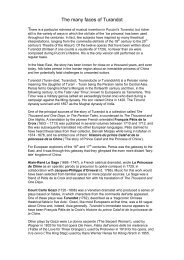NEF-Southampton-Positive-Money-ICB-Submission
NEF-Southampton-Positive-Money-ICB-Submission
NEF-Southampton-Positive-Money-ICB-Submission
You also want an ePaper? Increase the reach of your titles
YUMPU automatically turns print PDFs into web optimized ePapers that Google loves.
This means that the ship to full-‐reserve banking, in which demand liabiliGes of the banks would be converted<br />
into central bank money, would not require an increase in the Bank of England’s liabiliGes.<br />
APPENDIX 5: Dealing With Cash<br />
There are two procedures needed for dealing with physical money (notes and coin) under full-‐reserve<br />
banking:<br />
1. A commercial bank buying cash from the Bank of England:<br />
The commercial bank would ‘buy’ physical cash by exchanging it for digital money held in the commercial<br />
bank’s OperaGonal Account at the Bank of England. The bank would take physical delivery of the cash, and<br />
the Bank of England would decrease the value of the bank's OperaGonal Account by a corresponding amount.<br />
The amount of cash circulaGng outside the Bank of England would increase, and the amount of digital money<br />
owned by commercial banks would decrease by the same amount.<br />
In effect, digital money would be converted into physical money without affecGng the overall money supply<br />
at all. This ensures that seasonal changes in the demand for cash (such as the Christmas season) do not<br />
increase the total money supply, and therefore do not cancel out or amplify the acGviGes of the Monetary<br />
Policy CommiOee.<br />
2. A bank customer taking cash out (via an ATM or bank teller):<br />
IniPally, the commercial bank would own the physical cash in its ATM, Plls and vaults. This cash would be<br />
recorded as an asset on the bank's balance sheet.<br />
When the customer takes £10 out of their account via an ATM (for example) then:<br />
·∙ The customer's TransacGon Account balance will decrease by £10<br />
·∙ Simultaneously, the commercial bank’s aggregate Customer Funds Account balance will decrease by<br />
£10 and the bank's OperaGonal Account will increase by £10 (£10 will have been transferred from<br />
their Customer Funds Account to their operaGonal account)<br />
·∙ The bank's cash holdings will fall by £10<br />
·∙ The customer will have the physical £10 note<br />
In effect, the bank has 'sold' the customer a £10 note in exchange for £10 of the digital money in their<br />
TransacGon Account. The £10 of digital money that belonged to the customer now belongs to the bank.<br />
The bank's assets are unchanged (cash holdings have decreased but the OperaGonal Account has increased<br />
by the same amount), and the bank's liabiliGes are unchanged (because TransacGon Accounts are not<br />
recorded as a liability of the bank).<br />
37



